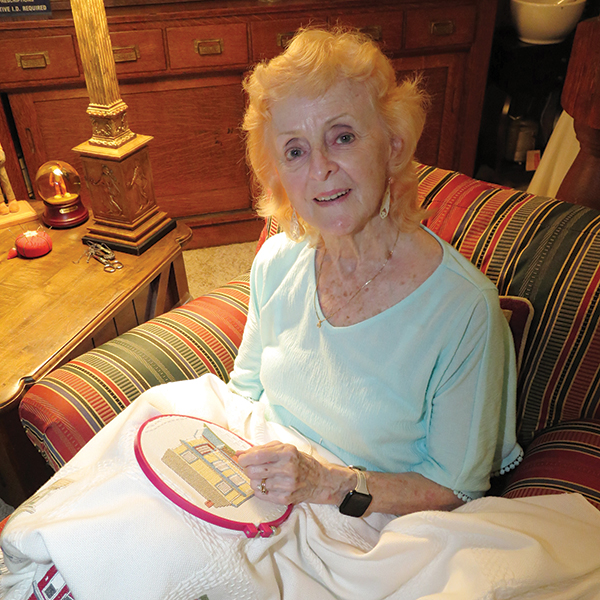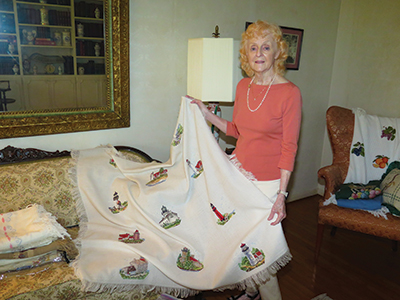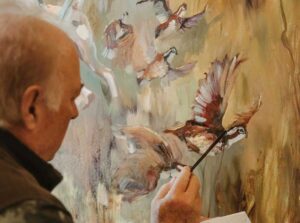
Amazing handiwork tells a story in every delicate stitch
Story by Leigh Pritchett
Photos by Graham Hadley
Carolyn Hall is surrounded by heritage.
In her parlor are shelves of medical books belonging to her grandfather, Dr. R.A. Martin, and a wicker baby scale from a nursery unit at Martin Hospital. A collection of apothecary jars recalls the three generations that her family ran the corner Rexall drug store in downtown Pell City.
In a sunny room down the hall are two exquisitely detailed quilts that her grandmother Ada Kincaid made prior to 1936. The stitching of one quilt forms an intricate feather design, while the stitching of the other quilt is an equally complex rose pattern.
Treasured heirlooms they are.
Such a setting seemed appropriate for discussing keepsakes – those Carolyn inherited, as well as those she is creating for her four children, six grandchildren and two great-grandchildren.
The trove of cross-stitch artistry she has sewn for her family represents thousands of hours of work spanning decades.
“I have done a little bit of everything with cross-stitch,” Carolyn said.
She has made switch-plate covers, Christmas ornaments, a multi-dimensional Christmas train, tablecloth and napkins, pillows, pictures and cross-stitch designs on sweatshirts.

Cross-stitch afghans are the bulk of her work. She has completed many different afghans, featuring lighthouses, dogs, cats, stars and sailboats, ABCs, mallards and fruit.
Each piece has its own unique story and exhibits the special bond between the giver and receiver:
The afghan with an Aztec motif was the choice of daughter Cindy, who lives in Tennessee.
Daughter Stacy, who lives in Birmingham, wanted the afghan of “ice cream colors” that Carolyn made in the 1990s. “This is my favorite (afghan),” Carolyn said.
Daughter Mick, who lives in Colorado, displays one of her mother’s afghans as an art piece. Mick’s features wild birds perched on branches that stretch from square to square across the afghan.
For the afghan of son Rob, who works in construction in Florida, Carolyn chose storefront designs. She even altered the size, shape and lettering on the apothecary sign to make it read “Pell City Drug Co.”
Each grandchild and great-grandchild has one of Carolyn’s afghans, and a stash of afghans awaits future great-grandchildren.
Susan Mann, assistant director of Pell City Library, said Carolyn’s creations are priceless treasures the children, grandchildren and great-grandchildren can “cherish. … They will be special keepsakes forever. And each time they see them or use them, they will think of her, and remember those sweet moments shared.”
Friends and neighbors also have been beneficiaries of some of Carolyn’s handiwork.
Much care goes into each cross-stitch piece because Carolyn wants flawlessness.
“I don’t want to do anything that isn’t first class,” she said.
Joyce Thrower of Pell City, who has known the Hall family at least 50 years, has seen nearly every piece Carolyn has finished.
“She does beautiful work. Everything she does is perfect,” Joyce said.
Susan, likewise, described Carolyn’s work as “meticulous.” She pointed out that Carolyn’s cross-stitch is as pretty on the back as on the front.
When trying to decide which of Carolyn’s afghans she likes best, Susan confessed, “Every time she does a new one, it becomes my favorite.”
But Susan did say her top three would be the colorful birds on a pale mint afghan; a kitten whose spilled milk “drips” down an afghan, and the Victorian “painted ladies” homes of Chincoteague, Va.
The last one is in progress. Carolyn started the “painted ladies” afghan around Labor Day 2019. In August 2020, she reached the halfway point.
Carolyn may spend a year or two, working almost every day, on one afghan until it is completed.
Her longest project took more than two decades. She started the piece – a cross-stitch, bed-cover quilt – when pregnant with Rob, her fourth child. She finished it when he was 23. In between, the project got shelved while she reared her children, was a homemaker and helped her pharmacist husband, Robert “Bob” Hall, run Pell City Drug Co.
A Pell City legacy
Carolyn’s grandparents – Dr. R.A. and Mary Martin – arrived in Pell City in its infancy.
“My grandfather moved here in 1903. He was a surgeon at the Gertrude Comer Hospital” at Avondale Mills, Carolyn said.
After the hospital closed in the 1920s, Dr. Martin opened a six-bed clinic above Pell City Drug Co.
When the building next door became available in the 1930s, Dr. Martin moved the hospital there. For more than 30 years, Martin Hospital occupied that building, which is now the law offices of Hugh E. and Gibson Holladay.
Carolyn and all four of her children were born in Martin Hospital.

As for Pell City Drug Co., Dr. Martin established it soon after arriving in Pell City. “That was one of the first Rexall franchises (in the nation),” Carolyn said.
Her mother, Mary Ruth Kincaid, later inherited Pell City Drug Co. and then Carolyn and Bob acquired it after Mary Ruth’s death. Carolyn and Bob, who had met while studying pharmacy at Auburn University, operated the drug store from 1961 to November 2001. In just two more months, the store would have been 99 years old.
The drug store, with its iconic soda fountain, was such a fixture and a necessity in Pell City that is was open every day except Christmas.
Until her last child was in high school, Carolyn worked at the store only when needed. But after long-time bookkeeper Annie Scott Stephens died, Carolyn assumed that job.
Bob passed away six years after retiring.
No idle hands here
When Carolyn was in junior high school, her grandmother Mary Martin taught her to embroider. Carolyn’s first pieces were pillowcases and dresser scarves, most of which she still has.
Though she gave up needlework for a time, she resumed after college, putting it down again during child-rearing.
What drew her back to it is the fascination of creating an art piece one stitch at a time.
“The creating is what I like,” Carolyn said. “This satisfies my creativity.”
Instead of using pre-stamped, cross-stitch patterns, Carolyn prefers the challenge of starting with a blank “canvas.” She must align the subject perfectly and count each stitch she sews in order to be precise.
“With cross-stitch, you’ve got to pay attention,” because one mistake affects the entire design, Carolyn said.
Some of her projects are so complex that they may require as many as 75 different thread colors.
Though dealing with macular degeneration and glaucoma, Carolyn sews for hours each morning. Often, she becomes so engaged that she does not want to put it down.
“It’s calming. It’s peaceful. It keeps your mind occupied. And you’re creating something. What’s not to like? … My grandmother would be proud,” she said. “… My grandmother didn’t believe in idle hands sitting around at night.”
Carolyn also walks four times a week, reads mysteries and is a volunteer hostess for library events. She might also be found on a travel adventure, such as Iceland in winter.
Just the same, she is always looking to the next cross-stitch challenge. Already, she has another afghan to begin after she finishes the “painted ladies” … in about a year.















